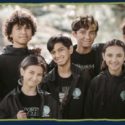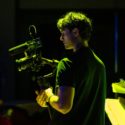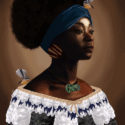More than 70 rangatahi between the ages of 14 and 18 from throughout the motu gathered at Taheke Marae, Okere Falls for a five-day development and leadership wānanga appropriately named Te Pūtake, Growing Tomorrow’s Leaders Today.
The strength and skill of each rangatahi was the starting point for a powerful collective process that strengthened their connection to Te Ao Māori. It inspired and motivated them to return home with the confidence to participate in, and lead, positive change within their whānau, hapū, iwi and communities.
Creating a violence free future
E Tu Whānau Relationship Manager, Parehuia Mafi attended the wānanga to support the rangatahi.
“Rangatahi know that if their generation wants to create a future free of violence where we as whānau, hapū and iwi thrive, then they, and Te Ao Māori, can and will change things.”
“The E Tu Whānau National Rangatahi Strategy in partnership with Te Korowai Aroha o Aotearoa is about supporting and reaching out to rangatahi all over the motu to pledge their services, time, energy and skill to achieving a violence-free future. They’re part of a movement for positive change and they’re truly an inspiration.”
The wānanga was the third in a series run by the indigenous education and training organisation Te Korowai Aroha o Aotearoa which works alongside E Tū Whānau across Aotearoa.
The rangatahi, many of whom are already seen as E Tū Whānau kahukura (leaders) within their peer groups, had been identified by their whānau, hapū and wider communities for their leadership qualities. In some cases, it’s their strength and ability to overcome adversity that has made them stand out as kahukura.
The rangatahi will deliver in-depth presentations on what they’ve learnt, how their learning has transformed them and how they would use their tikanga Māori to resolve conflict at a korowaitanga (graduation) in Tolaga Bay at the end of November 2015.
Last week’s wānanga was held outside Rotorua and hosted by Ngāti Pikiao and acknowledgments must also be made to Te Papa Takaro o Te Arawa. Previous wānanga were held in Taumarunui, hosted by Tūwharetoa, and in Kaikohe, hosted by Ngāpuhi Iwi Social Services.
Quotes from rangatahi
Here’s what some rangatahi have to say about what, for all of them, has been a life changing and inspirational experience.
“I’ve learnt kawa and tikanga that were new to me, things I’d never have been exposed to if I hadn’t had this opportunity. The wairua session was particularly good. The focus was on just letting yourself be who you are, blocking out the negative and reconnecting with ancestors. This is something I would never have done if I hadn’t come to this wānanga.”
Merania Paraone (Ngāti Whātua), aged 14, is a student at Kaipara College, Kaitaia.
“I met a few of the kaimahi for this wānanga when we hosted them at Tāheke, my marae. They encouraged me to take part and I’m glad I did. It’s given me a greater understanding of Māoritanga and who am as a whole person − the kaimahi and the kaupapa reconnects us with who we are. I now understand why I’m down on some things at my school. It’s given me some closure around that.”
Awatea Rikirangi-Thomas (Te Arawa) aged 16 is from Rotorua and is currently a student at Epsom Girls Grammar.
“‘Nothing is too great to accomplish and nothing is too small to attempt’ − that’s one of the sayings used here and it sums up what these three wānanga have taught me. I came here to find out more about my own identity – who I am and where I belong in this world – and help others find theirs. The tikanga and kawa we shared helped us develop our cultural understanding of who we are.
“I feel proud of our culture and its values and inspired to go home to share my experiences and try to influence change, I want to share all the energy I’ve gathered from these wānanga with my whānau and hapū and help revitalise our culture. I want to inspire all iwi to succeed within Te Ao Māori.”
Keenan Hau-Hage (Nga Puhi) aged 18 is a student at Bay of Islands College.
“It’s been great. All the stuff we learnt about – kawa tikanga, mauri, atua − and realising we can connect with that any time we want to, has made me feel stronger. It’s made me feel more connected with parts of my family that have moved away from Taumaranui – it helps carry me back to them.”
Kaahukurauenuku (Hani) Rakaupai aged 12 is a student at Te Kōhanga Ngā Puke, Taumarunui.
John: “This has been a spiritual journey for me and we don’t get many opportunities to take that journey in our modern Māori world. I’m now inspired to take what I’ve learnt back up north and share it with others. There is a saying – ‘leave no stone unturned’. I feel like I’m slowly getting to understand that metaphor in relation to Te Ao Māori.”
Phoenix: “These wānanga have taught me that you have to take care of yourself before you can really help anyone else. Change starts with ourselves and in order to change others you have to change yourself.”
Phoenix and John Henare Clarke are twins. They’re aged 16 and students at Northland College, Kaikohe.



